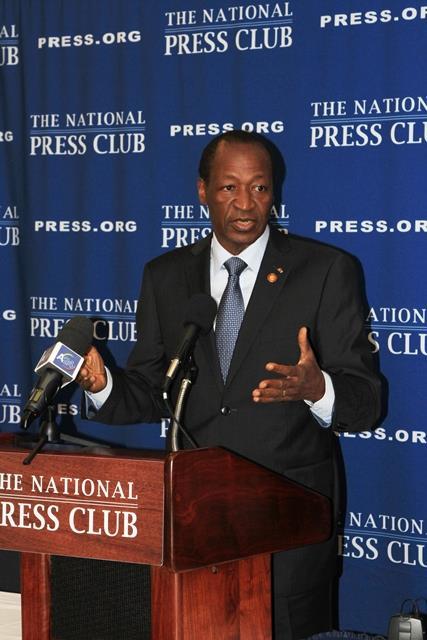In Our Town: African Leader at Press Club Thanks U.S., Sees ‘Africa Rising’
By • August 18, 2014 0 887

Our city is just like any other mid-sized-creeping-up-on-major-sized city in America—we’ve got our neighborhood picnics, our street-corner musicians, our restaurants and music festivals and farmers markets, and baseball teams and theaters and charities and yard sales and dog parks, just like anybody else.
Except when we’re not just like everybody else. On a day-to-day basis, that would be the presence of the seat of the Government of the United States of America and all of its branches, what with the president, and the Supreme Court justices, and all our elected officials on the Hill and their sundry staff members and the bone-white Capitol and White House. That would be the monuments and the free museums. And that would be the embassies of every country recognized by United States, which on a day-to-day basis add a special international flavor to the city. In other words, we have a lot of people in this city who are from somewhere else and not just from Scranton or San Francisco.
Sometimes, a whole bunch of them come at once, and gather together for the kind of traffic-stopping, street-packing, siren-filled confab with flag-fluttering official black limos rarely seen anywhere else in the country. That happened last week with the U.S.-Africa Leaders Summit, hosted by the White House, in which political and economic leaders from nearly 50 countries from Africa came and stayed from Aug. 1 to Aug. 4 for a series of talks, meetings, discussions, group brain storming, dinners—and some more dinners—all over the city, led President Barack Obama, whose father hailed from Kenya.
In this mind-boggling gathering, tackling issues of economics, entrepreneurships, women’s rights and place in society, culture and business, climate change and global warning, the growing threat of Ebola in Western Africa, the threat of terrorism throughout the region, locals could hear the echoes of the issues on their television screens, in local coverage, on the Internet and in newspapers, or even just talking with cab drivers, a major proportion of whom, in the District, hail from Ethiopia, and Eritrea and Nigeria.
Several African leaders spoke at the National Press Club during the course of the summit. The last of them—Burkina Faso President Blaise Compaore—summed up the gathering in a Newsmaker talk in the club’s Zenger room last week.
Compaore, who has been president of the smallish country, bordering Mali and Niger in West Africa since 1987, is the founder the country’s political party, the Congress for Democracy and Progress. In 1983, a military coup, led by Captain Thomas Sankara, Compaore and others toppled Major Jean-Bapstiste Ouedraogo and created a Marxist-flavored government. In 1987, Compaore came to power in another coup, in which his friend Sankara was killed.
Over time and several elections—it is not clear yet whether Campaore will run again next year—the Burkina Faso president reversed much of the country’s Marxist policies and has tempered his role and burnished an image as conciliator and negotiator among warring factions and with the region’s radical groups.
Speaking in French, Compaore called the gathering a success and noted that Africa, as a continent of numerous diverse governing bodies, cultures and countries, needed to work together with each other. With the help and leadership of the United States, Compaore said, “Africa is rising. But no one can do this by themselves.” He noted the troubles in neighboring Mali, the threat of Ebola and the need for women to have a bigger role in each country’s economic, and governing and politics. “Everyone is entitled to an education,” he said. “We must make sure that women in our countries receive their entitled and fair share, not just young men.”
“I think we are making progress in this as a nation, and as a continent, although there are still pockets of resistance to the idea of women playing a major role in society, not just in the home, but in schools, as entrepreneurs, as leaders,” Compaore said.
In this civil press club setting or in the many stories in the press, some of the focusing on the fashion style of the first lady of Cameroon, or on the dinner gatherings in posh restaurants all over D.C., the immense difficulties—from hunger, AIDS, political unrest, terrorist groups, the control and development of resources—seemed a continent away.
What was evident in the event, hosted by the Press Club for a president of a country whose name even politically smart residents of our city might be hard pressed to recognize, there were opportunities presented and opportunities taken by visitors and locals alike to have a closer look at each other and exchanges ideas. Or just mingle and socialize at restaurants like Mintwood Place in Adams Morgan, Equinox, Acadiana or Bourbon Steak in Georgetown — or even at a reception held by the Women’s Ambassadors Foundation at the Ronald Reagan Building and International Trade Center after the talk.

